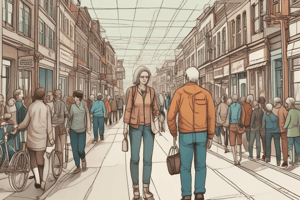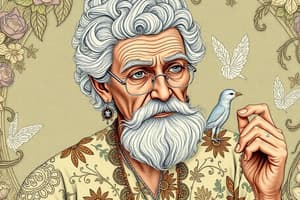Podcast
Questions and Answers
What age range defines the young-old category?
What age range defines the young-old category?
- 65-84 (correct)
- 55-64
- 100+
- 85-99
Why is the young-old period referred to as the 'golden years'?
Why is the young-old period referred to as the 'golden years'?
- It is a time of significant emotional distress.
- It is marked by a high increase in responsibilities.
- This age group experiences more health issues than any other.
- Individuals often have good health, sufficient finances, and leisure opportunities. (correct)
What is the primary distinguishing feature of the young-old compared to those aged 85 and older?
What is the primary distinguishing feature of the young-old compared to those aged 85 and older?
- Increased social isolation.
- Higher likelihood of chronic diseases.
- Greater dependence on long-term care.
- Better physical, emotional, and cognitive health. (correct)
What characterizes the lifestyle of young-old individuals?
What characterizes the lifestyle of young-old individuals?
Which of the following is NOT a characteristic of the young-old age category?
Which of the following is NOT a characteristic of the young-old age category?
Which chronic diseases are most common among the young-old?
Which chronic diseases are most common among the young-old?
What aspect of aging is associated with the period of 65 to 84 years?
What aspect of aging is associated with the period of 65 to 84 years?
Which age category follows the young-old stage?
Which age category follows the young-old stage?
What percentage of the oldest-old population accounted for the U.S. older adult population in 2015?
What percentage of the oldest-old population accounted for the U.S. older adult population in 2015?
Which of the following conditions is NOT among the most common reasons for hospitalization in the oldest-old population?
Which of the following conditions is NOT among the most common reasons for hospitalization in the oldest-old population?
What is the predicted percentage of the oldest-old in the U.S. population by 2050?
What is the predicted percentage of the oldest-old in the U.S. population by 2050?
What is the relationship between age and hospitalization rates for the oldest-old?
What is the relationship between age and hospitalization rates for the oldest-old?
What proportion of the oldest-old population requires some assistance with daily living activities?
What proportion of the oldest-old population requires some assistance with daily living activities?
What is the trend in hospitalization rates for urinary tract infections among the oldest-old?
What is the trend in hospitalization rates for urinary tract infections among the oldest-old?
How do the living conditions of the oldest-old compare to the youngest-old population?
How do the living conditions of the oldest-old compare to the youngest-old population?
What demographic feature characterizes the oldest-old population in relation to chronic ailments?
What demographic feature characterizes the oldest-old population in relation to chronic ailments?
Flashcards
Young-old age category
Young-old age category
Individuals aged 65-84, often considered the 'third age' following childhood and work/parenthood stages.
Third Age
Third Age
The period of life between 65-84, marked by relative health and social engagement.
Oldest-old
Oldest-old
Individuals aged 85-99.
Centenarians
Centenarians
Signup and view all the flashcards
Typical health of young-old
Typical health of young-old
Signup and view all the flashcards
Social engagement in young-old
Social engagement in young-old
Signup and view all the flashcards
Cognitive abilities of young-old
Cognitive abilities of young-old
Signup and view all the flashcards
Independence in young-old
Independence in young-old
Signup and view all the flashcards
Oldest-old age group
Oldest-old age group
Signup and view all the flashcards
Oldest-old population growth trend
Oldest-old population growth trend
Signup and view all the flashcards
Oldest-old hospitalization rates
Oldest-old hospitalization rates
Signup and view all the flashcards
Common hospitalization causes (oldest-old)
Common hospitalization causes (oldest-old)
Signup and view all the flashcards
Hospital outcomes (oldest-old)
Hospital outcomes (oldest-old)
Signup and view all the flashcards
Long-term care needs (oldest-old)
Long-term care needs (oldest-old)
Signup and view all the flashcards
Marital status of the oldest-old
Marital status of the oldest-old
Signup and view all the flashcards
Gender differences in the oldest-old
Gender differences in the oldest-old
Signup and view all the flashcards
Study Notes
Late Adulthood Age Categories
- Late adulthood is divided into three categories for comparison: young-old (65-84), oldest-old (85-99), and centenarians (100+).
- These categories reflect differences in biological, psychological, social, and chronological aspects of aging, and the increasing lifespan.
Young-Old (65-84)
- This group is sometimes referred to as the "third age," following childhood and work/parenting.
- This period is generally considered the "golden years," characterized by fewer responsibilities and potential for leisure and self-fulfillment with good health and finances.
- This age group experiences relatively good health, social engagement, knowledge, expertise, and adaptive daily living compared to the oldest-old.
- Strong performance in attention, memory, crystallized intelligence is common.
- They are more similar to midlife adults than oldest-old adults.
- Chronic diseases like cardiovascular disease, hypertension, and cancer are common, but often preventable, manageable, or lessenable.
- This group reports high levels of happiness and well-being.
- The average young-old adult is less likely to need long-term care, be dependent, or poor. They are also more likely to be married and living independently and working for pleasure, not income.
Oldest-Old (85-99)
- This age group is often called the "fourth age."
- Characterized by more serious chronic ailments compared to the young-old.
- Rapid growth globally—projected to be more than 300% larger than current numbers.
- Projected to reach nearly 18 million by 2050 in the U.S.
- Females comprise a larger percentage of this group, but also experience more chronic illnesses and disabilities than males in this age category.
- Hospitalizations are more common for this group, accounting for a significant portion of hospitalizations (even though they represent a small percentage of the U.S. population).
- Common hospitalization reasons include congestive heart failure; pneumonia; urinary tract infections; septicemia; stroke; and hip fractures.
- More likely to require long-term care and be in nursing homes compared to the young-old group.
- Still, most live in their communities.
- Less likely compared to young-old adults to be married and living with a spouse.
Studying That Suits You
Use AI to generate personalized quizzes and flashcards to suit your learning preferences.




